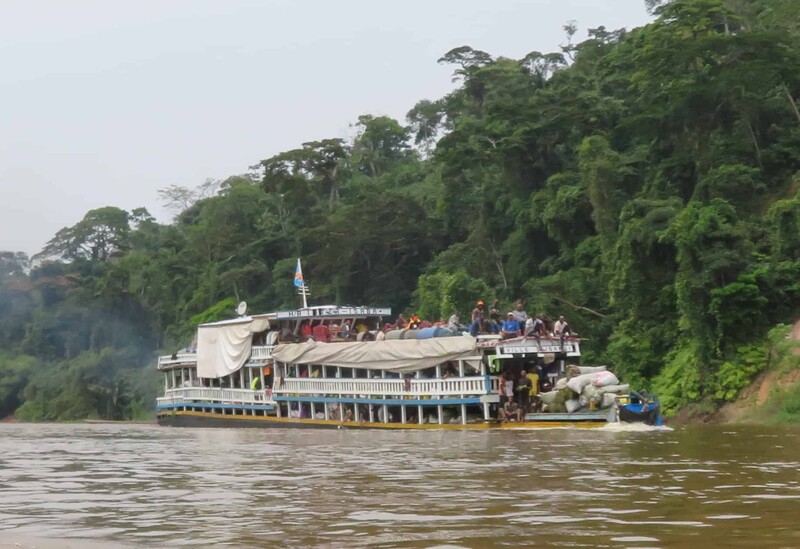![]()
Attending as Keynote Speakers) 15-19 January 2024 International Conference: Social spaces, languages, and material culture in the history of the northern Congo Basin @Kisangani (Université Libre de
2023/07/22
This is a mirror for the information published on June 14, 2023 in the following site:
https://banturivers.eu/en/15-19-january-2024-kisangani-ulb-unikis-international-conference-social-spaces-languages-and-material-culture-in-the-history-of-the-northern-congo-basin/
15-19 January 2024, Kisangani (ULB – UNIKIS), International Conference: Social spaces, languages, and material culture in the history of the northern Congo Basin
Ecrit par Birgit Ricquier
The conference invites scholars in anthropology, archaeology, linguistics, history, and related disciplines to a joint reflection on social, linguistic and material differentiations and interactions marking the history of the northern Congo Basin. The ERC project “BANTURIVERS” highlights the historical formation of social spaces, from the Bantu Expansions until today, with a particular interest in the spatial distribution of 1) economic, social, and political exchange relations, 2) languages and 3) material culture (pottery styles and techniques, metallurgy, and fishing). As such, the conference has a preference for presentations related to the following axes:
Social and economic exchanges: what types of relationships promote exchange between the inhabitants of Tshopo (and beyond), and what is the spatial distribution of these ties? This axis focuses on the historical emergence, as well as the contemporary activation and production, of economic ties (between merchants on the local markets, between interdependent socio-professional spheres, between fisherfolk and agriculturalists, etc.) and social ties (between parents and pseudo-parents, between specialists, etc.), on the local and regional scale (individual, village, clan) and a larger scale (ethnic, long-distance trade, etc.)
Language: the second axis focuses on the formation of languages and the role of language in the history of the relevant speech communities. Is it possible to identify linguistic occurrences which reveal specific historical ties between social groups? To what extent and in what way are social and cultural differentiation reflected in linguistic structures, and vice versa?
Techniques and material culture: the third axis concerns the techniques and material characteristics of pottery, metallurgy and fishing. What do archaeological and historical remains reveal about social and cultural ties? What indicators of socio-political continuity and rupture are visible in ancient material cultures such as pottery and metallurgy? What can we conclude with respect to the evolution of the communities that produce pottery and metallurgy, from their arrival in the region until the present period? How do the shaping techniques of objects inform us of sociocultural contexts over time? What can we learn from fishing techniques?
Social formation and identification: by focusing on past and present practices of identification, this axis focuses on dynamic processes of identity construction. How can we assemble empirical cases that (re-)produce, challenge, and/or reveal the limits of the (colonial) conception of a fixed relationship between identity and spatial belonging? Land conflicts, linguistic innovation and hybridization, WhatsApp groups of so-called ressortissants, the plurality of ethnic claims and belonging, the use of the past as a resource to renegotiate oral traditions, the quest for official recognition by social groups in formation, change of clans, the practice and formation of pseudo-kinship and joking relationships, etc. are all examples through which this theme can be addressed.
Keywords: northern Congo Basin, spatial distribution, social spaces, identity formation, languages, pottery, metallurgy, fishing
Keynote speakers:
Takako & Yuji Ankei, Institute for Biocultural Diversity, Japan
Jean-Pierre Donzo Bunza Yugia, ISP-Gombe, DRC
Nancy Rose Hunt, University of Florida, USA
Practical information:
The conference will take place from 15th until 19th January 2024, at the University of Kisangani. We expect 5 days of conference in order to avoid parallel sessions and encourage exchange. The duration of presentation should be 20 minutes.
The conference will be organized in a hybrid fashion (on site and online). However, considering that the connection might be unstable, participation on site is preferable. Travel information will be communicated to the accepted participants.
Submission details:
Please send an abstract of maximum one page, including all authors and references, to , no later than 15 September 2023.
Important dates:
Abstract submission: 15/09/2023.
Notification of acceptance: 30/09/2023.
Organizers:
Ali, Birgit, Daou, David, Laurent, Liz, Nicolas M.L., Nicolas N., Peter & Victor



